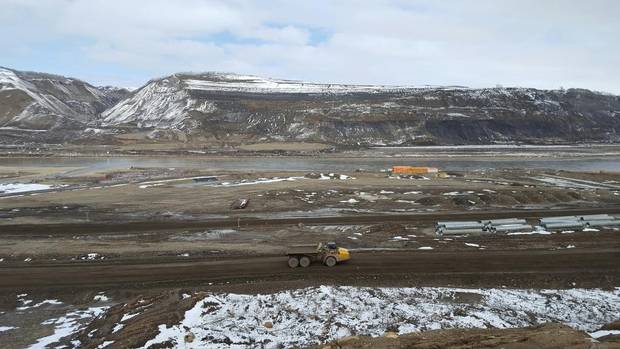On the floor of the Peace River Valley, the biggest capital construction project in the history of British Columbia is taking shape. Every day, more than 2,000 workers clock in to dig for bedrock that will anchor the base of the Site C hydroelectric dam, and to strip the riverbanks before the reservoir floods the valley.
The BC Liberal government has tried to get this $8.8-billion project past the point of no return before the May 9 provincial election; however, if the NDP form government, the project may never be completed.
No matter what verdict is delivered by voters on their next government, the outcome will have a strong impact on the province's approach to resource development, the environment and Indigenous rights. And the path forward that B.C. takes on those issues will be felt across the country.
Explainer: Everything you need to know about the B.C. election campaigns
The two main parties – the Liberals, who have governed the province for 16 years, and the NDP, who have served as the Official Opposition all that time – promise to take B.C. in different directions. The Greens, having won just one seat in the previous provincial election, have had an outsized influence on their rivals, reflecting the coast's strong leanings toward sustainability.
But the Liberals have made it their mantra to "get to yes" on resource development, while the NDP have vowed to block billions of dollars' worth of development because of environmental concerns or aboriginal opposition.
The Site C dam illustrates the divide: With a peak capacity of approximately 1,100 megawatts, the BC Liberals say the project will encourage economic growth and could help Alberta wean itself off coal power.
The New Democrats have sided with environmental and First Nation critics who oppose the dam due because of the threats to farmland, wildlife and traditional uses of the land. An NDP government would send the project to a review if elected, to determine whether the project is the most cost-effective way to build new capacity – and if the additional power is really needed. But they would continue with construction while that review is carried out. More than $4-billion has been spent or committed. Left unanswered is whether they would hand out pink slips to workers halfway through construction.
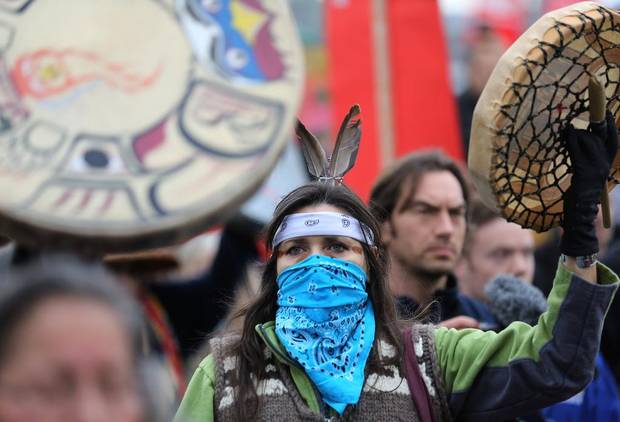
First Nations protester Ceci Point of the Musqueam Band marches against the proposed expansion of Kinder Morgan’s Trans Mountain Pipeline in Vancouver on Nov. 19, 2016.
CHRIS HELGREN/REUTERS
In British Columbia, the political debate is framed by these dimensions: Jobs versus sustainability, and what degree of influence should the province's 203 First Nations have on those decisions. In this election, British Columbian voters will be choosing where the balance should rest.
It is a traditional resource economy – still rooted in forestry, mining and natural gas – but it is also the birthplace of North America's first carbon tax and the home of the Great Bear Rainforest that protects 6.4 million hectares of the B.C. coast. And it is here, in a bid to gain consent for expanded oil-pipeline capacity to get Alberta's oil to tidewater, that Prime Minister Justin Trudeau announced a $1.5-billion ocean-protection plan, which he described as "the most significant investment ever made to protect our oceans and coastlines."
In addition, British Columbia has been at the leading edge of defining modern Indigenous rights, which are intertwined in almost every resource development in this province where the founding colonial government mostly overlooked the resolution of treaties – a failure that is felt today across the sectors of mining, forestry and energy.
The United Nations Declaration on the Rights of Indigenous Peoples (UNDRIP), newly blessed by the federal Liberals after formal concerns lodged by the previous Conservative government, is one of the key dividing lines between the political parties.
It's promise of free, prior and informed consent is the lens that the BC NDP would apply to every action taken by government – in step with Ottawa. However, the BC Liberals warn that UNDRIP could cripple the economy if consent turns out to be veto power.
In 2014, The Supreme Court of Canada delivered a landmark ruling in the case of a small Indigenous community in central B.C. that has huge implications for natural-resource industries across the country. In the William decision, aboriginal communities gained important new economic assets, and powerful leverage over development by outsiders.
But the decision did not grant those communities a veto.
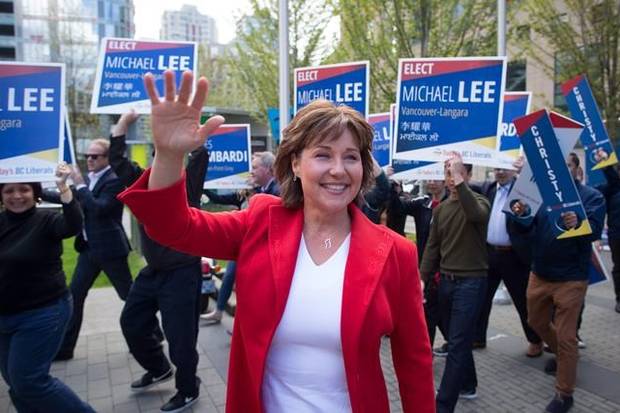
BC Liberal Leader Christy Clark arrives for a leaders debate in Vancouver on April 26, 2017./
Darryl Dyck/THE CANADIAN PRESS
BC Liberal Leader Christy Clark is convinced some of the wording in UNDRIP holds the prospect of an effective veto: "I think that British Columbians would say no single group of people or individuals should have a veto over the things that happen in our province," she said during an editorial-board meeting with The Globe and Mail this week. "For me, I'm not looking for ways that we can say no to each other, I think we should be looking for ways to say yes to each other, yes to economic development."
The Heiltsuk Nation on the central coast of British Columbia signed a protocol agreement with Ottawa earlier this year in which Canada promises to uphold UNDRIP's principles within their territories, located in the heart of the Great Bear Rainforest. With this, the Heiltsuk people hope to assert some measure of control over logging and grizzly bear hunting on their lands, and the shipment of oil off their shores. Without the B.C. government on board, however, that sought-for collaboration will be limited.
Marilyn Slett, chief councillor of the Heiltsuk First Nation, played host to Ms. Clark a number of times last year in the Heiltsuk traditional territory, which spans 3.5 million hectares, for initiatives related to the preservation of the Great Bear Rainforest. She is unimpressed with Ms. Clark's position on UNDRIP.
The province is responsible for most issues around resource development. A Liberal victory on May 9 means B.C. will not adopt the same approach as Ottawa. In an interview, Chief Slett said: "The Liberal Party is fear-mongering about UNDRIP and that only hurts First Nations and it hurts British Columbians. We really need to be involved in discussions about resource development from the start, not after the fact."
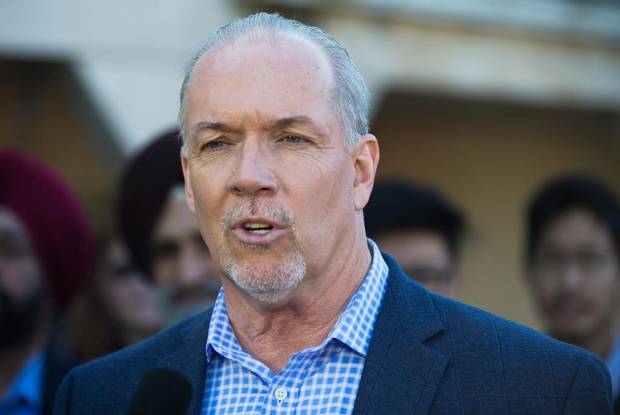
NDP Leader John Horgan during a campaign stop outside a supporter’s home in Richmond, B.C., on May 4, 2017.
DARRYL DYCK/THE CANADIAN PRESS
John Horgan, the NDP Leader, told The Globe’s editorial board this week that he is committed to taking conflict over the land base out of the courts. He said B.C.’s economy needs to be developed “so that we can all benefit from our natural resources and ensure the economic activity that flows from that benefits the Nations who have title to the land – or will, over time – and the UN declaration is a step along that road,” he said.
"A dollar spent by First Nations or the Crown in court is a dollar wasted. Negotiation is the best course of action. Title exists, it's real and it's going to happen right across the province."
The Canada-U.S. softwood-lumber dispute has become, in this election, another sharp wedge.
Mid-campaign, Ms. Clark lobbed a retaliatory grenade at the Trump administration by calling on Canada to ban thermal-coal movements through B.C. ports. "It's incomprehensible that the federal government would ban the movement of oil on the coast of British Columbia, and not ban the movement of coal," she said this week. When Ottawa was silent on her request, she vowed to use provincial authority to slap a prohibitive levy on those shipments.
Ms. Clark says it is a measure she has long wanted to take, but she feared upsetting delicate negotiations between Canada and the United States on softwood lumber. Now that the United States has imposed a punitive tariff on Canadian lumber, however, she said she is free to follow her desire to attack "dirty coal" and help the environment.
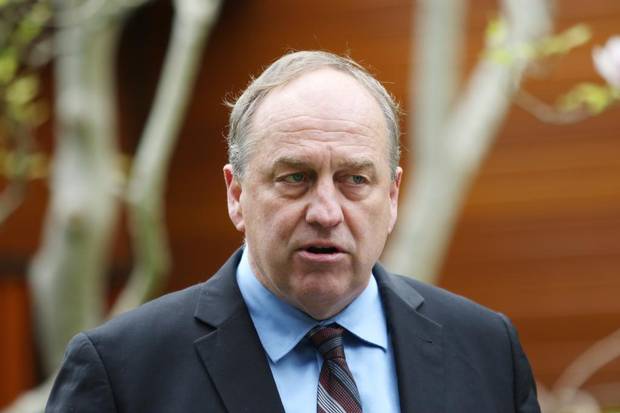
B.C. Green party leader Andrew Weaver speaks to media at the University of Victoria on May 3, 2017.
CHAD HIPOLITO/THE CANADIAN PRESS
The measure takes aim at the United States but ensnares Alberta, as well. Ms. Clark said she did not speak with Alberta Premier Rachel Notley before announcing her decision, but she suggested Ms. Notley should welcome the move: Ms. Notley questioned her counterpart's legal right to make the move.
Mr. Horgan has described Ms. Clark's retaliation measures as reckless sabre-rattling. He said he would sit down with the Prime Minister to discuss joint measures, calling the softwood-lumber dispute the greatest threat today to B.C.'s economy. (It is worth $4.6-billion to the province annually, and B.C. produces 60 per cent of Canada's exports to the United States.) He would not rule out retaliation, but said he would not be bound by Ms. Clark's coal tariff.
British Columbia makes up 13 per cent of Canada's economy, but beyond that, it plays a critical role as Canada's gateway to the Pacific. This is the home of the country's largest port. Between Vancouver and Prince Rupert, B.C. ports handle more than 150 million tonnes of cargo worth in excess of $200-billion annually, most of it Canadian imports and exports.
Yet, whether it is coal or oil, the heat of the campaign has produced little empathy from either leader toward the economic stakes for the rest of the country.
Mr. Horgan has "agreed to disagree" with his NDP counterpart in Alberta about the Kinder Morgan oil pipeline expansion project, which he has vowed to use every lever at his disposal to stop.
While Ms. Notley can't count an NDP government in B.C. to support her need to get Alberta oil to new offshore markets, Ms. Clark has brushed aside concerns about embroiling Alberta in her thermal-coal trade threats.
The NDP is counting on Ottawa to help fund new daycare spaces, housing and public transit. But what would a government under John Horgan offer the rest of Canada in exchange?
"We're citizens of Canada, that's what we have to offer," he said. "It's kind of part of the terms."
The decision is for B.C. voters alone. Their decision will be felt across the country.
MORE FROM THE GLOBE AND MAIL:
